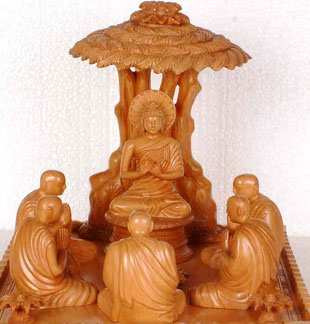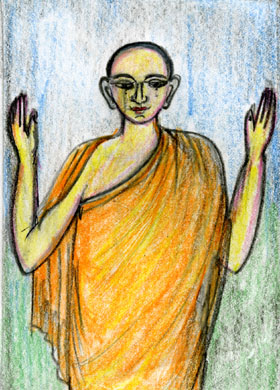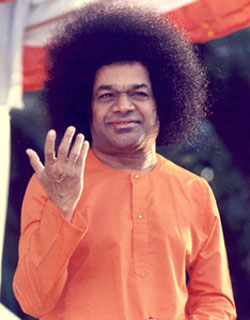 |
 |
 |
 |
| Volume
3 - Issue 9 SEP 2005 |
THE REAL CLOSENESS Through Love and Trust by Dr. Sara Pavan
The Buddha and His Disciples Mahakashyap was a true disciple of Lord Buddha and he experienced such real closeness. Each person has his or her individual degree of nearness and dearness, love and trust, towards the Master. Mahakashyap remained in such closeness with the Master all through his life until the Buddha’s life ended, when he too left his body, because he could not survive in separation. That is Mahakashyap's uniqueness, his oneness with his Master. There were other enlightened disciples who did not die with Gautama, the Buddha. When Mahakashyap died, it became a very significant question, whether truly enlightened disciples should also die as had happened to Mahakashyap. One of the disciples, Moggalayan, said:
Ananda’s Elusive Enlightenment Ananda was of a different kind altogether. He remained unenlightened even though he lived in close proximity to the Buddha for forty-two years. No one could have stayed that close for so long, but Ananda enjoyed such special privileges being the Buddha’s first cousin. When Ananda asked the Buddha to initiate him to become His disciple, he took advantage of his closeness to the Master prior to initiation and laid three conditions, aware of the fact that he would have to do whatever the Master commanded him to do after he became a disciple. Ananda said:
The three conditions Ananda asked were: 1. That he would always stay with the Master and that He shouldn’t be sent anywhere to spread the Message. 2. That the Master would meet anybody he brought along, even in the middle of the night. That this personal privilege would not ever be denied. 3. That he would always sleep in the same room as the Master sleeps, that he would not be moved away from the Master even in sleep. The Buddha gave His promise, and these three conditions were adhered to fully all through the years. But Ananda did not become enlightened. One could understand Ananda’s pain and anguish because those disciples who had come long after him became enlightened, while he remained in his ignorance just as he was before. Ananda wondered, what would become of him when the Buddha passed away? Although he had been with the Master for so long, day in and day out, twenty-four hours a day, he did not become enlightened. Without the Master around he felt he would have no hope whatsoever. However, the Buddha explained to Ananda the reasons for his failure, and how His departure would bring the change:
Eventually, when the Buddha passed away the enlightened disciples convened a meeting to write down everything the Master had taught them over the years. However, Ananda was not permitted to take part in the meeting because he was deemed ignorant and unenlightened. Others, though enlightened, were also disadvantaged in that none of them had been so close to the Master continuously as Ananda had been. But, they still doubted Ananda’s reliability – whether he had understood the Buddha’s Messages correctly or if he would make up things with his own imagination; whether he remembered everything accurately, or if he would give his own interpretation on what the Buddha had said. Ananda’s New Joy Something transpired as he sat outside crying. Ananda had never cried in his entire life. With those tears his ego was washed away and he became like a child.When the disciples came out of the conference room they saw Ananda still sitting outside, but he looked transformed and radiant. The old Ananda, the old egoistic person had vanished. They saw an innocent being with tears of joy and they all could see the light surrounding him. With great joy they invited Ananda inside. They were bewildered by the fact that Ananda could not attain enlightenment for forty-two years in spite of his close proximity to the Buddha, but no sooner had the Master departed he attained that state, exactly as the Master had continuously remarked. The Buddha’s departure alone brought about the death of Ananda’s ego. Ananda’s contribution to the recollection of His teachings was immense. So it is not a question of one person being decisive. Each person has to be unique in his own way. Somebody dies for the Master, somebody lives for the Master, and others become enlightened only after the Master is no more on the physical plane, each a unique individual. You cannot say who is greater - perhaps no comparison should be made. All are themselves unique and inimmitable! Just remember one thing - your love. Then wherever you are, near or far in space and time, it does not matter. And, beyond a certain level, even time does not matter. When time and space become immaterial, then you have really touched the feet of the Master. Then whatsoever transpires in you – whether to live for the Message of the Master or to die with the Master, whatever comes naturally and spontaneously to you - let it happen. “What has all this got to do with us?” devotees of the Kali Yuga Avatar, Bhagavan Sri Sathya Sai Baba may ask. Well, the story in its subtleness reveals the different kinds of disciples the Buddha had, each one with his own uniqueness. In comparison to the millions who follow our Beloved Lord Sai, Sai Buddha for the Buddhist Sai devotees, more than two and half millenia ago the Buddha must have had less than a few hundred of disciples, nay even less. But, the story has a powerful message for all of us, the countless millions who aspire to be, or believe they are devotees of Bhagavan Baba. In conversation with Dr. John Hislop in 1982, Bhagavan Baba said: “... In the years to come many devotees would ‘fall’ on the wayside like chaff blown away by strong wind. Only those with steady faith will remain. In fact, I will add strength to the mind and intellect of those dear to me...” Yes! The winds of change are intense. The real Master-Disciple connection is inside and beyond the limitation and boundaries that the body may define. What we are about to witness and experience in the Divine Mission of our Messiah, God in our midst, is the quantum leap in awareness of the Eternal Oneness with Him, the very One within each one of us, the force of Love, Light and Splendour. In conclusion, my prayer to Bhagavan is to ask Him to forgive us for all our erroneous thoughts and feelings that hold us back and prevent us from dissolving into His Supreme Self, the All-pervasive Consciousness. You are our only destination Lord, and You alone can guide us through. May the “Inner-Voice” that is You, be heard loud and clear each day.
|
Vol 3 Issue 9 - September 2005 |
Optimized for Netscape and Firefox. Best viewed in Internet Explorer - 1024 x 768 resolution. |




